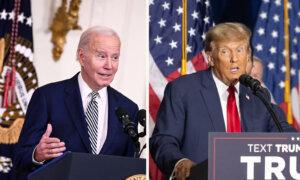He had appointed special counsel Jack Smith, who is now prosecuting two separate criminal cases against President Trump. Both cases were brought last year, after President Trump was well into his campaign, and Mr. Garland declined to comment on the timing of those cases.
“The prosecutions that you’re talking about were brought last year, and the special prosecutor has said from the beginning that he thinks public interest requires a speedy trial, which I agree with, I do,” Mr. Garland said. “And the matter is now in the hands of a trial judge to determine when the trials will take place.”
Pressed on issues of timing, and the likely collision of upcoming trial dates and elections, Mr. Garland declined to elaborate.
“The cases were brought last year, the prosecutor has urged speedy trials with which I agree. It’s now in the hands of the judicial system, it’s not in our hands,” he said. “Special prosecutors followed the facts and the law, they brought cases when they were ready.”
Accusations of partisanship have been made against the department, including by high profile defendants President Trump and Hunter Biden, son of President Joe Biden. Each have argued that the cases against them are politically motivated.
“Of course it concerns me,” Mr. Garland said of the allegations. “What we have to do is show by the acts that we take that we’re following the law, that we’re following the facts.”
Some legal experts have also raised questions as to whether the appointments of these special counsels were proper, recently filing such arguments in court records as amicus briefs in President Trump’s cases.
“We have reasserted and clarified the norms of this Justice Department,” Mr. Garland told CNN. “We follow the facts wherever they lead. Politics is not a part of our determinations. It would be improper, and it’s not.”
Mr. Garland said the department follows the regulations required of special counsel.
“We have appointed people who are formerly, veteran, career prosecutors,” he said.
Mr. Garland was asked whether he believed these prosecutors were “sufficiently independent.”
Jack Smith Appointment
Former Attorney General Edwin Meese III argued in an amicus brief that Mr. Smith does not have the authority to prosecutor the cases he is leading and that “neither Smith nor the position of Special Counsel under which he purportedly acts meets those criteria.”
He argued that Mr. Garland erred because the statutes that allow lower courts to appoint special counsel “do not authorize the creation and appointment of Special Counsels at the level of United States Attorneys.”
A federal prosecution such as the one against President Trump “can be taken only by persons properly appointed as federal officers to properly created federal offices,” he wrote. The Constitution requires such a federal office to be established by statute, Mr. Meese explained.
He pointed to United States v. Nixon, and argued that in this historic case it was the Department of Justice as an institution that had prosecuted President Richard Nixon, rather than an individual acting independently but supposedly with the department’s authority.
“As a related, threshold matter, amicus must also respectfully raise the inconvenient constitutional truth that the underlying criminal prosecution is itself illegitimate as private citizen Jack Smith does not hold a valid appointment to speak for, or act on behalf of, the U.S. Department of Justice (DOJ),” Mr. Williams argued.
Case Calendar
President Trump was originally scheduled to go to trial on March 4 in Washington and then in May in the Southern District of Florida in the two cases Mr. Smith is prosecuting.
However, the volume and complicated nature of the discovery materials in the Florida case has created a delay, and the presiding judge has indicated a later trial date may be likely.
The March trial is likely to be delayed as well, prosecutors have indicated in court filings. An appeals court is considering a motion to dismiss in this case on an expedited basis now, and additional appeals from President Trump’s side are expected if the motion is rejected.
However, prosecutors have argued that even if the March 4 date passes, the case should go to trial in the current term in the interest of the public.
Original News Source Link – Epoch Times
Running For Office? Conservative Campaign Consulting – Election Day Strategies!


